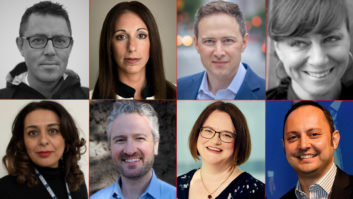Day One of TVBEurope’s MediaTech 360 Summit covered a range of topics, including 5G, artificial intelligence, machine learning, and the impact of the pandemic on the industry.
Hosted by Oisin Lunny, day one began with a discussion on the revolutionary rise of 5G in the media supply chain. The panel’s speakers included the BBC’s Purminder Gandhu, 5G technologist Muki Kulhan, Brendan Yam SVP from ViacomCBS Digital Studios International, and BT Sport’s Matt Stagg.
Gandhu discussed how 5G will be a “massive” user of 5G, and stated that the BBC doesn’t want to just be sold packages by the mobile operators, but instead wants to engage with them. “It’s important that as broadcasters move towards fully IP, 5G will be an enabler on that,” she added. “But, there isn’t a lot of technology for us to get our hands on and play with at the moment.”
Stagg detailed BT Sport’s work with 5G, which has been split into three areas: production, in-home experiences, in stadium augmented reality.
“The litmus test will be the audience,” added Kulhan. “Will they have that connectivity, will they have an enhanced experience inside the stadium?”
“It’s about putting the fan in charge of their experiences, but maintaining editorial control,” explained Stagg. “Our ethos is taking the fan to the heart of sport, so we want to make the fan feel they have a connection with us as the broadcaster. The industry is moving from one-to-many for sport to one-to-one. 5G and IP workflows enable that.”
Yam explained that the it’s important to get the telcos excited about the possibilities of 5G in broadcast, and to do that the audience needs to be excited. “We think there is an onus on us to work with the telcos and vendors and take these game changing technologies and show the audience what they can do,” he added. “We need to engage with production and try new cameras, new overlays. The exciting thing is that we can do that now.”
Gandhu concluded the panel by reminding everyone that 5G won’t just have an impact on connectivity but also creativity. “What’s really important is not only opening up the experience for the fans, but providing greater creativity for the people who are creating content. Being able to move untethered cameras around, incorporating drone feeds into shots etc. 5G technology won’t just enable better connectivity, it will challenge content creators to push the boundaries.”
Can AI replace a human? No!
Kulhan was back for the panel looking at applications and opportunities for artificial intelligence and machine learning. She was joined by analyst Chris Evans from Futuresource Consulting, KPMG’s Hugo Pinto and Richard Welsh from Deluxe.
A lot of the discussion centred on where AI and ML are already being used in the media industry with Welsh telling the audience a lot of AI’s use is not necessarily obvious.
“Some of the use cases you don’t even know they’re there, but they’re all over the place,” agreed Pinto. “When you talk about creativity you need to consider abstract thinking. Does data quantify it? Can you quantify creativity?”

Welsh cited an interesting example of research the team at Deluxe have been carrying out with the help of artificial intelligence. “If you push into the creative area, you can start to find patterns that maybe you didn’t realise were there,” he explained. “We looked into colour grading and you could map a colourist’s choices across a particular piece, and then at other things they’d worked on, and there was a lot of correlation.”
Evans added there’s a huge opportunity for AI in the broadcast industry. “As we begin to introduce more data in broadcast we can train AI to do more,” he said.
But that brought a spirited response from Kulhan: “AI has been around for a long time. Can AI replace a human? No! It’s a tool that you can implement to make things smarter.”
The panel ended with a warning about the ethical employment of AI. “We need standardisation from the vendors,” said Evans. “Someone needs to make sure AI is eating a nutritious diet of information.”
The media tech industry is so vibrant right now!
The final panel of day one focused on TVBEurope’s recent 2021 MediaTech Outlook report. It featured contributors to the report, including the DPP’s Mark Harrison, UKTV’s Sinead Greenaway, Signiant’s Mike Flathers and Tal Hewitt from EY Parthenon.
Hewitt kicked the discussion off on a very positive note. “Two things we saw during 2020 was strategic ability, the ability to pivot and launch new products really quickly, and to have an appetite for learning on the job,” she told the audience. “Innovation is baked in for media tech companies, but we saw a difference in companies that were able to escalate that and take advantage of the tail winds.
“The media tech industry is so vibrant right now. There’s a real momentum here that we can build off, which is actually quite exciting.”
She added: “Media and broadcasting is already in the process of change and has got used to it, but there is still a lot more that can be done. I can see a difference in companies that are set up to embrace technology change and those that are holding on to revenues.”
According to Harrison relevance is a key word for the industry at the moment. “It can help you avoid distraction,” he said. “There is this sense that everybody has got to change really, really fast. That may be true if you’re a big business with a lot of history, you might see a decline of your core business. But, it may mean to a new way of delivering. You might not need to become this crazily different thing.”
Greenaway also wanted to stress a positive note about how UKTV, and the broadcast industry in general, had dealt with an extremely challenging 12 months. “We have really come together as a community. From a technology point of view, we ran an enormous programme of work. We rapidly rolled out systems, we learnt new ways of working. I think this has been about confidence, what we’ve seen is the confidence of the technology industry. It feels really directional. We have the confidence to say out loud that I’m building into cloud, looking into IP, balanced with questions around procurement.
“What we’ve done is learn. What’s been interesting is when people say they’re cloud ready and they aren’t. We’ve learnt that the hard way!” she added.
In terms of the future, Greenaway said the way broadcasters work has fundamentally changed. “We have an inclusive workplace, a workplace that is driven by purpose. What we do as business will be informed by that. What we come back to has got to be better, and additive, and a richer experience for our teams.”
Forced innovation was a topic covered by Flathers. He told the audience that it had come to light in 2020 more than ever. “Remote editing, editing in the cloud, a lot of people have been building up to it. It used to be all about remote editing at a broadcast facility or a production lot. The pandemic pushed that.
“Straight efficiency has become more important over the last year,” he added. “How fast, how much you can transfer. The infrastructure around us is changing, it’s not the infrastructure we had five years ago. We need to focus on how we work with everything around the data we move.”
Hewitt concluded the session with a look forward, and revealed immersive experiences appears to be a key topic of discussion in 2021. “We’re looking at the younger generation, Gen Z and below, and how to engage youth in the work that we’re all doing,” she explained. “It all keeps coming down to immersive experiences. How do you take the experience beyond the screen? My crystal ball prediction is after we’ve all been through the last year, the future is about doing, not talking about it.”
Which takes us back to where we started…
Day two of the MediaTech 360 Summit continues on 26th March with topics including virtual production, the future of TV, and mentoring in the broadcast industry. We’ll also be travelling to a galaxy far, far away. Register for free here.
The TVBEurope 2021 MediaTech Outlook report is available to download here.
Videos of all the MediaTech 360 Summit panels will be available to watch on catch-up from 29th March.







